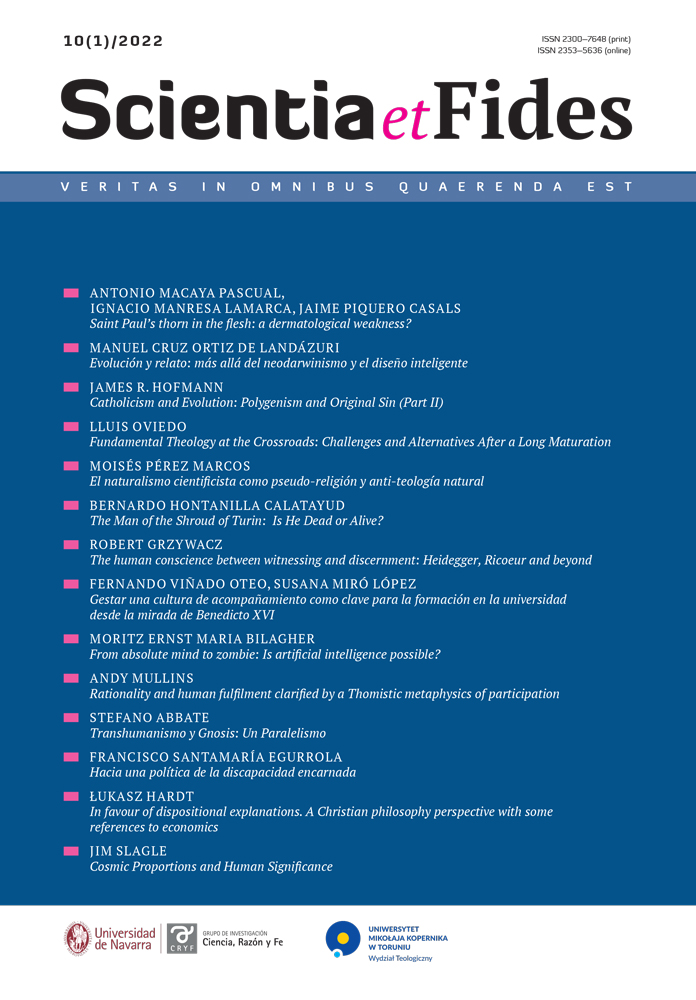Fundamental Theology at the Crossroads: Challenges and Alternatives After a Long Maturation
DOI:
https://doi.org/10.12775/SetF.2022.003Słowa kluczowe
Apologetics, Revelation, Faith, Credibility, Secularization, ScienceAbstrakt
Fundamental Theology (FT) has undergone a slow evolution, as many other theological disciplines, since its inception in the aftermath of the Second Vatican Council. The lapsed time invites us to reflect about the current situation in this field and to what extent that theological section is pursuing its main objectives, especially for its teaching at different levels. After examining several issues that could have influenced that development, some suggestions for advancing the field and its teaching will also be given. Indeed, both the internal and external contexts have changed quite a lot in the last 60 years, and this probably will influence a treaty that should be more contextually sensitive and very bound to developments in religious education.
Bibliografia
Aguirre, Anthony, Brendan Foster, Zeeya Merali (Eds.). 2019. What is Fundamental? Cham, Switzerland: Springer.
Angel, Hans-Ferdinand. Ll. Oviedo, R.F. Paloutzian, A, Runehov, R.J. Seitz (Eds.). 2017. Processes of Believing: The Acquisition, Maintenance, and Change in Creditions. Dordrecht: Springer.
Barton, John. 2019. A History of the Bible: The Book and Its Faiths. London: Allen Lane.
Benedict XVI, 2019: https://www.catholicnewsagency.com/news/full-text-of-benedict-xvi-the-church-and-the-scandal-of-sexual-abuse-59639
Bevans, Stephen B. 1992. Models of Contextual Theology. Maryknoll - New York: Orbis.
Castillo, Ramon D., H. Kloos, M. J. Richardson, & T. Waltzer. 2015. Beliefs as Self-Sustaining Networks: Drawing Parallels between Networks of Ecosystems and Adults’ Predictions. Frontiers in Psychology 6, 1723. doi: 10.3389/fpsyg.2015.01723.
Connors, Michael H. and Peter W. Halligan. 2015. “A cognitive account of belief: a tentative roadmap”. Frontiers in Psychology 5, Article 1588.doi: 10.3389/fpsyg.2014.01588.
De Cruz, Helen and Johan de Smedt. 2014. A Natural History of Natural Theology: The Cognitive Science of Theology and Philosophy of Religion. Cambridge, Ma: MIT Press.
Frei, Hans W. 1992. Types of Christian Theology. Yale: Yale University Press.
Jones, James. 2016. Can Science Explain Religion? The Cognitive Science Debate. Oxford: Oxford University Press.
Lindbeck, George A. 1984. The Nature of Doctrine: Religion and Theology in a Postliberal Age. Louisville, MO, London: Westminster John Knox.
Niebuhr, Richard. 1951. Christ and Culture. New York: Harper & Row.
Pié i Ninot, Salvador. 2017. Teología Fundamental. Madrid: BAC.
Seitz, Ruediger J. & Hans-Ferdinand Angel. 2014. “Psychology of religion and spirituality: Meaning-making and processes of believing”. Religion, Brain & Behavior 5 (2), 139-147.
Smith, Aaron C. T. Thinking about Religion: Extending the Cognitive Sciences of Religion. 2014. Basingstoke, UK, New York: Palgrave MacMillan.
Pobrania
Opublikowane
Jak cytować
Numer
Dział
Licencja
Prawa autorskie (c) 2022 Scientia et Fides

Utwór dostępny jest na licencji Creative Commons Uznanie autorstwa – Bez utworów zależnych 4.0 Międzynarodowe.
CC BY ND 4.0. Posiadaczem prawa autorskiego (Licencjodawcą) jest Autor, który na mocy umowy licencyjnej udziela nieodpłatnie prawa do eksploatacji dzieła na polach wskazanych w umowie.
- Licencjodawca udziela Licencjobiorcy licencji niewyłącznej na korzystanie z Utworu/przedmiotu prawa pokrewnego w następujących polach eksploatacji: a) utrwalanie Utworu/przedmiotu prawa pokrewnego; b) reprodukowanie (zwielokrotnienie) Utworu/przedmiotu prawa pokrewnego drukiem i techniką cyfrową (e-book, audiobook); c) wprowadzania do obrotu egzemplarzy zwielokrotnionego Utworu/przedmiotu prawa pokrewnego; d) wprowadzenie Utworu/przedmiotu prawa pokrewnego do pamięci komputera; e) rozpowszechnianie utworu w wersji elektronicznej w formule open access na licencji Creative Commons (CC BY-ND 3.0) poprzez platformę cyfrową Wydawnictwa Naukowego UMK oraz repozytorium UMK.
- Korzystanie przez Licencjobiorcę z utrwalonego Utworu ww. polach nie jest ograniczone czasowo ilościowo i terytorialnie.
- Licencjodawca udziela Licencjobiorcy licencji do Utworu/przedmiotu prawa pokrewnego nieodpłatnie na czas nieokreślony
PEŁEN TEKST UMOWY LICENCYJNEJ >>
Statystyki
Liczba wyświetleń i pobrań: 1976
Liczba cytowań: 0



